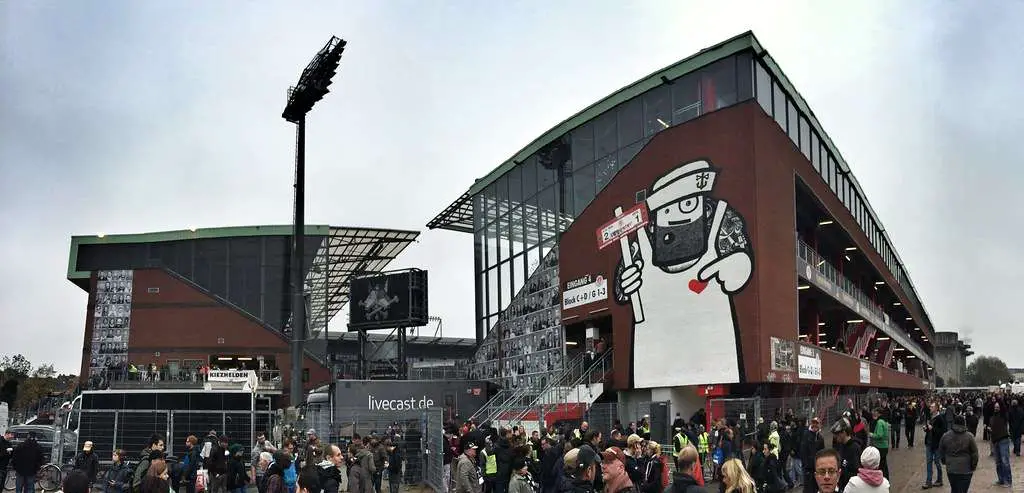They are the community-based club from the working-class area of Hamburg. The punk club of Germany, just as interested in anti-fascism as they are in the iconic skull and crossbones badged team they support. They are St. Pauli, the Kult club that “always take a stand against racism and homophobia, always look out after the weak and the poor, because it’s important for us. It’s in our blood.”
As a community, St Pauli are steadfast in their stands against all kinds of discrimination and are the first club in Germany to adopt guiding principles including “social responsibility and promoting the interests of members, employees, supporters and volunteers beyond the sphere of sport; tolerance and respect and social responsibility.”
They are not alone in mixing football with politics. Rayo Vallecano, known as the Last of the Barrio teams, are the Madrid based side whose fervent and passionate fanbase saw them band together with the players to rehouse an elderly fan who had been evicted from her Vallecas apartment in 2014. And because they are such a passionately left wing fanbase opposed to any and all kinds of discrimination, they prevented an alleged Nazi supporter from joining the club as a striker.
Then there is Livorno, whose Livornese identity sees them demonstrate their communist sympathies with a spectacular display after they returned to the Serie A for the first time in 55 years in 2004 with a huge banner on the Curva Nord showing the hammer and sickle, with a banner reading, “A long night is disappearing – at the horizon, our sun is rising”. The left wing tendencies of the fanbase has also shown them display solidarity with Palestine and hold fundraising events at the Stadio Armando Picchi for the Haiti earthquake among others.
So, FC St Pauli aren’t alone in their publicly left wing beliefs but they are probably the most famous example of a football club being shaped by their political identity.
After all, Fußball-Club St Pauli von 1910 e.V. are not exactly a successful club. And yet the Kiezkickers are a worldwide brand with 25,600 official club members as of 2018, an impressive number for a 2. Bundesliga side, and more than 400 registered supporter’s clubs around the globe. The Kiezkicker have more name recognition than many top-flight German clubs.
The Hamburg team have stores selling merchandise, with the undeniably cool skull and cross bones logo, around the world. Including, curiously, in Madrid, the home of one of their likeminded clubs in Rayo Vallecano. 198, the name of the store, even makes appearances at hipster-esque festivals in the city where the Madrileño sides remain absent such is the level of their popularity in the city.
Why is then that St Pauli are a team with a worldwide name?
“FC St Pauli is a way of life”
It wasn’t until the 1980s that the small team from Hamburg began to make a name for itself. During a time when much of European was struggling to cope with an increase in fascism and right-wing related hooliganism, St Pauli, offered the alternative. A refreshing concoction of liberal politics, refugee friendly and thanks to being located near the red-light district of Hamburg, sexually progressive views.
They not only offer the alternative to the mega-rich corporation clubs like Bayern Munich but as Uli Hesse put it for the Guardian: “The club says the right things, does the right things, and wears the right clothes. It’s a welcome antidote for people who have become disillusioned with the greed, the hype, and the emptiness of modern football.”
In 2010, the ‘Buccaneers of the League’ (just one of the many pretty cool nicknames the club has) hosted a tournament for recently arrived refugees in Germany and in 2016 they helped with establishing an all refugee team in Hamburg, with an all women coaching team called FC Lampedusa to boot.
This sets them apart from other clubs, such as Livorno who despite a politically active side tend to stick to more home-based Livornese and Tuscan problems.
The right place, the right time
There is another advantage St Pauli have over other similarly minded clubs, their location. As of 2019, Germany has the best supported clubs in the world with the 2. Bundesliga, in particular, the tenth best supported league in the world and also the best supported second division in the study conducted by CIES Football Observatory.
The atmosphere created by German fans on matchdays are world famous and many clubs have become popular weekend tourist destinations for those wanting football-filled holidays. Dortmund, Schalke, Munich, Braunschweig and St Pauli themselves are all popular destinations for a weekend away for football mad fans.
That isn’t something teams like Rayo Vallecano can compete with, support for football teams in Germany is spread out, but in Spain 1 in 3 people follow either Barcelona or Real Madrid, who Rayo share a city with. The other team in Madrid, Atletico, are no small fry either.
La Liga might boast two of the biggest teams in the world and some of the best players, but attendances in Spain are dwindling with less of an ‘away day’ culture like there is in England and Germany.
Even within Germany, St Pauli are handily placed unlike Union Berlin, another club who have made a name for themselves for their political leanings. During the 1970s many left leaning fans around the globe lent their support to Union thanks to their anti-establishment stance and rivalry with the government backed Dynamo Dresden, the government at the time being the Stasi.
But a divided Berlin provides a very different landscape to a Hamburg made famous by its wide and varied music scene (which includes The Beatles in their early years), a more liberal city allows more room for a fanbase to grow.
An identity
St Pauli’s guiding principles adopted in 2009 make for a fascinating read. Many of the points made clear on the club website are there to ensure the social and political responsibility of the club, independent and regardless of any success the club may enjoy on the pitch.
Considering the plight of a few clubs in England, the sorry cases of Bolton and Bury for instance, many of the principles may make a few fans wistful with the Kiezkickers placing a huge emphasis on any club actions not being driven by any “commercial considerations but by social compatibility, diversified offering, sustainability and ecology.”
Everything the club does, must be supporter friendly and be in line with the left-wing principles they are so famous for. So much so, that when VIP boxes and executive seats were installed at the Millerntor-Stadion, the gorgeously named Social Romantics (the fan’s names for themselves) protested.
It’s easy to see why St Pauli have endured as a cult favourite club around the world. They have retained and acted on the same beliefs they have held for 30 years while the footballing world around them has succumbed to transfer hysteria, slimy super-agents and mega-rich owners sucking the lifeblood out of football clubs and surrounding communities.
Other clubs, like Rayo Vallecano, can say the same but the Hamburg based team are different. What started out as a fan-culture movement in the 80s has filtered upwards and become what so many who love football dream of, a football club for the fans.
St Pauli might be based on the Sinful Mile of Hamburg, but there’s nothing bad about this club.
By Matthew Gibbs.










